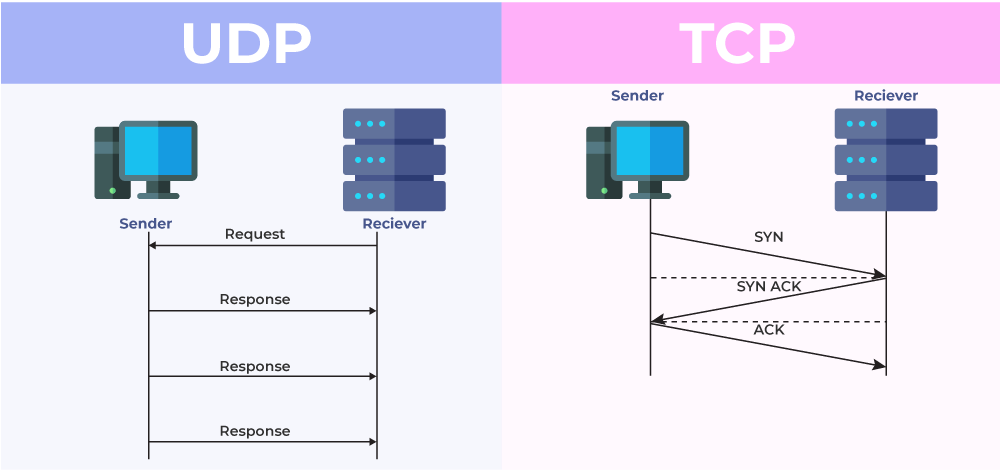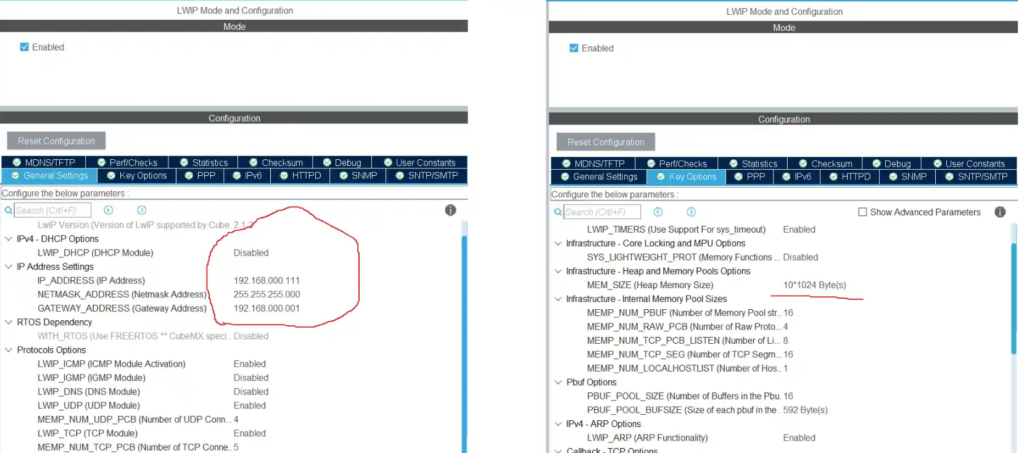
STM32 Ethernet Sever
Preface
The previous section provided an initial introduction to setting up Ethernet on ST MCUs and pinging the ID. This section will cover two common Ethernet protocols: UDP and TCP. Both server and client configurations will be introduced, and the differences between the two, along with key considerations, will be discussed. The next section will delve further into issues related to LWIP and other related topics.
UDP Vs TCP
Both protocols are commonly used, with UDP being more frequently utilized in wireless transmission and TCP in wired transmission. A comparison is shown below. Essentially, TCP is more reliable than UDP, but TCP is slower in terms of transmission efficiency.



STM32CubeMX setting
This is basically the same as the previous setup. There is nothing special, and it applies equally to both UDP and TCP.


Coding For SERVER
Here, you can see that most functions are already established and ready to use. Besides initially declaring the IP, the main point is receiving data.
UDP
void udpServer_init(void)
{
// UDP Control Block structure
struct udp_pcb *upcb;
err_t err;
/* 1. Create a new UDP control block */
upcb = udp_new();
/* 2. Bind the upcb to the local port */
ip_addr_t myIPADDR;
IP_ADDR4(&myIPADDR, 192, 168, 0, 111);
err = udp_bind(upcb, &myIPADDR, 7); // 7 is the server UDP port
/* 3. Set a receive callback for the upcb */
if(err == ERR_OK)
{
udp_recv(upcb, udp_receive_callback, NULL);
}
else
{
udp_remove(upcb);
}
}
TCP
void tcp_server_init(void)
{
/* 1. create new tcp pcb */
struct tcp_pcb *tpcb;
tpcb = tcp_new();
err_t err;
/* 2. bind _pcb to port 7 ( protocol) */
ip_addr_t myIPADDR;
IP_ADDR4(&myIPADDR, 192, 168, 0, 111);
err = tcp_bind(tpcb, &myIPADDR, 7);
if (err == ERR_OK)
{
/* 3. start tcp listening for _pcb */
tpcb = tcp_listen(tpcb);
/* 4. initialize LwIP tcp_accept callback function */
tcp_accept(tpcb, tcp_server_accept);
}
else
{
/* deallocate the pcb */
memp_free(MEMP_TCP_PCB, tpcb);
}
}
For UDP, receiving is mainly handled in the callback function.
void udp_receive_callback(void *arg, struct udp_pcb *upcb, struct pbuf *p, const ip_addr_t *addr, u16_t port)
{
struct pbuf *txBuf;
/* Get the IP of the Client */
char *remoteIP = ipaddr_ntoa(addr);
char buf[100];
int len = sprintf (buf,"Hello %s From UDP SERVER\n", (char*)p->payload);
/* allocate pbuf from RAM*/
txBuf = pbuf_alloc(PBUF_TRANSPORT,len, PBUF_RAM);
/* copy the data into the buffer */
pbuf_take(txBuf, buf, len);
/* Connect to the remote client */
udp_connect(upcb, addr, port);
/* Send a Reply to the Client */
udp_send(upcb, txBuf);
/* free the UDP connection, so we can accept new clients */
udp_disconnect(upcb);
/* Free the p_tx buffer */
pbuf_free(txBuf);
/* Free the p buffer */
pbuf_free(p);
}
For TCP, it requires additional writing.
static err_t tcp_server_accept(void *arg, struct tcp_pcb *newpcb, err_t err)
{
err_t ret_err;
struct tcp_server_struct *es;
LWIP_UNUSED_ARG(arg);
LWIP_UNUSED_ARG(err);
/* set priority for the newly accepted tcp connection newpcb */
tcp_setprio(newpcb, TCP_PRIO_MIN);
/* allocate structure es to maintain tcp connection information */
es = (struct tcp_server_struct *)mem_malloc(sizeof(struct tcp_server_struct));
if (es != NULL)
{
es->state = ES_ACCEPTED;
es->pcb = newpcb;
es->retries = 0;
es->p = NULL;
/* pass newly allocated es structure as argument to newpcb */
tcp_arg(newpcb, es);
/* initialize lwip tcp_recv callback function for newpcb */
tcp_recv(newpcb, tcp_server_recv);
/* initialize lwip tcp_err callback function for newpcb */
tcp_err(newpcb, tcp_server_error);
/* initialize lwip tcp_poll callback function for newpcb */
tcp_poll(newpcb, tcp_server_poll, 0);
ret_err = ERR_OK;
}
else
{
/* close tcp connection */
tcp_server_connection_close(newpcb, es);
/* return memory error */
ret_err = ERR_MEM;
}
return ret_err;
}
The UDP part is simpler, while the TCP part requires extra work, not only for receiving but also for writing the processing flow and other details, making it more rigorous.
tcp_server_recv
static err_t tcp_server_recv(void *arg, struct tcp_pcb *tpcb, struct pbuf *p, err_t err)
{
struct tcp_server_struct *es;
err_t ret_err;
LWIP_ASSERT("arg != NULL",arg != NULL);
es = (struct tcp_server_struct *)arg;
/* if we receive an empty tcp frame from client => close connection */
if (p == NULL)
{
/* remote host closed connection */
es->state = ES_CLOSING;
if(es->p == NULL)
{
/* we're done sending, close connection */
tcp_server_connection_close(tpcb, es);
}
else
{
/* we're not done yet */
/* acknowledge received packet */
tcp_sent(tpcb, tcp_server_sent);
/* send remaining data*/
tcp_server_send(tpcb, es);
}
ret_err = ERR_OK;
}
/* else : a non empty frame was received from client but for some reason err != ERR_OK */
else if(err != ERR_OK)
{
/* free received pbuf*/
if (p != NULL)
{
es->p = NULL;
pbuf_free(p);
}
ret_err = err;
}
else if(es->state == ES_ACCEPTED)
{
/* first data chunk in p->payload */
es->state = ES_RECEIVED;
/* store reference to incoming pbuf (chain) */
es->p = p;
/* initialize LwIP tcp_sent callback function */
tcp_sent(tpcb, tcp_server_sent);
/* handle the received data */
tcp_server_handle(tpcb, es);
ret_err = ERR_OK;
}
else if (es->state == ES_RECEIVED)
{
/* more data received from client and previous data has been already sent*/
if(es->p == NULL)
{
es->p = p;
/* handle the received data */
tcp_server_handle(tpcb, es);
}
else
{
struct pbuf *ptr;
/* chain pbufs to the end of what we recv'ed previously */
ptr = es->p;
pbuf_chain(ptr,p);
}
ret_err = ERR_OK;
}
else if(es->state == ES_CLOSING)
{
/* odd case, remote side closing twice, trash data */
tcp_recved(tpcb, p->tot_len);
es->p = NULL;
pbuf_free(p);
ret_err = ERR_OK;
}
else
{
/* unknown es->state, trash data */
tcp_recved(tpcb, p->tot_len);
es->p = NULL;
pbuf_free(p);
ret_err = ERR_OK;
}
return ret_err;
}
Server Handle
static void tcp_server_handle (struct tcp_pcb *tpcb, struct tcp_server_struct *es)
{
struct tcp_server_struct *esTx;
/* get the Remote IP */
ip4_addr_t inIP = tpcb->remote_ip;
uint16_t inPort = tpcb->remote_port;
/* Extract the IP */
char *remIP = ipaddr_ntoa(&inIP);
esTx->state = es->state;
esTx->pcb = es->pcb;
esTx->p = es->p;
char buf[100];
memset (buf, '\0', 100);
strncpy(buf, (char *)es->p->payload, es->p->tot_len);
strcat (buf, "+ Hello from TCP SERVER\n");
esTx->p->payload = (void *)buf;
esTx->p->tot_len = (es->p->tot_len - es->p->len) + strlen (buf);
esTx->p->len = strlen (buf);
tcp_server_send(tpcb, esTx);
pbuf_free(es->p);
}
